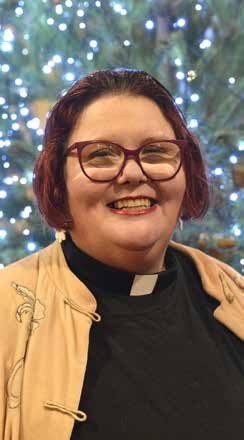COVER
‘A calling like no other’
Jackie Macadam considers the challenges of rural ministry.

Jackie Macadam
IT’S so pretty, isn’t it? That little kirk building with its steeple, up there at the mouth of the glen, dramatic clouds scudding by and the light making it look like something out of the novel Wuthering Heights. We smile and we carry on past in the car, eyes back on the main road as we drive on towards the day’s shopping and eating in the town 50 miles further on….
The ‘Rural Church’ as we call it, is not always quite as isolated as the one in our little scenario, but it does face considerable – and specific – problems that city and town churches do not have to deal with.
Ministers and parishes who work and live in rural communities have become adept at being innovative – and are working hard to find ways around the particular challenges the rural church faces.
“I am still fairly new to parish ministry, having only been inducted into my first charge during Advent (I would advise any minister to think carefully before adding that particular challenge on top of everything else!),” laughs the Rev Jade MacLean, parish minister for Cromdale and Advie Parish Church, linked with Grantown and Dulnain Bridge Church.
“Since beginning this journey, I have felt drawn to rural ministry – a calling like no other. True, it presents unique challenges, but it also offers deep rewards for those who serve in these communities. While the image of a rural church often brings to mind small, close-knit congregations in picturesque, tranquil settings – and to be fair that is not far from the truth – the reality of ministry in these areas comes with its own difficulties, especially in relation to discernment and training,” she says.
“I believe, one of the biggest obstacles facing rural churches is the lack of available ministers to supervise and train candidates or probationers. With fewer ministers in post, those who are in place are often stretched thin, covering multiple parishes. This makes it difficult for them to take on the additional responsibility of mentoring new candidates, even when they would love to do so.
“Beyond the shortage of supervisors, there is also the challenge of distance. Many candidates and probationers must travel long distances to meet with their supervisors or participate in church activities. Unlike urban settings, where churches and clergy are often closer together and public transport is available, rural placements can require hours of driving.”
She adds: “Accommodation is another major barrier. Many rural areas simply do not have affordable housing available for those who must move for training. In some locations, rental prices are exceptionally high, making it difficult for candidates to find somewhere to live. Some placements do not offer accommodation at all, adding another layer of difficulty for those considering rural ministry.
“Thankfully, I was blessed to find wonderful people who opened their doors to me, people I now consider family, but this may not always be the case for others.”
And, especially for younger ministers, the issues do not always end there.
“For those with families, rural ministry presents additional challenges. If a candidate’s family is based in a different part of the country, long distances and time constraints may make regular visits impossible. Days off can be completely consumed by travel. Not having family nearby can also lead to feelings of isolation and loneliness, particularly for those who are used to having a strong support system close at hand.”
But it is not all negative, Jade insists. “Despite these challenges, rural ministry has incredible positives that should not be overlooked. Rural congregations are deeply supportive of their ministers and candidates. The sense of community is often strong, with people looking out for one another in ways that can be harder to find in larger, more anonymous urban settings. Throughout my training, I felt upheld by the communities I became part of, and that support has remained a vital source of encouragement.
“Additionally, for those training for ministry, rural supervisors bring a wealth of experience. They understand both the joys and the struggles of this calling and are more than willing to offer their wisdom, guidance, and encouragement. The nature of rural ministry allows candidates to experience a broad range of ministerial tasks. This kind of hands-on experience is invaluable and prepares candidates well for future ministry.
“Ultimately, I know rural ministry is a calling worth exploring. By recognising the challenges and working together to find solutions, we can ensure that those who feel drawn to serve in rural churches are supported and encouraged – just as I was blessed to be.”
The Rev Donald McCorkindale has served in rural ministry considerably longer than Jade and encountered similar issues in the past.
“My transition, 14 years ago, after 20 years in central belt ministry to serving in the West Highlands, a region encompassing Ardgour, Kingairloch, Strontian, Morvern, and, more recently, Acharacle and Ardnamurchan, has been a fascinating journey adapting to the challenges, enjoying the immense rewards and joys, while navigating the geographic and demographic obstacles of rural ministry,” he explains.
“One of the most striking challenges is the sheer scale of territory relative to a smaller, more dispersed population. In the central belt, I once ministered in a parish population of around 11,000 within an 11-square-mile parish. Now I work in a huge area representing around 2.5% of the land area of Scotland, with approximately 2,000 population (and several times as many sheep!). With about 100 people engaging regularly in the life of the Kirk – that’s 5% of the population – almost double what I would ever have seen in the central belt! While the percentage is high, the numbers are low! Individual financial offerings are significant and sacrificial, yet together barely enough to sustain the fragile congregations.
“Long, mainly single-track roads separate our six church buildings, meaning that I simply cannot be present everywhere each Sunday. To meet these challenges, we have had to be both flexible and innovative. One critical strategy has been the shared leadership and collaborative worship. With the assistance of an attached Reader, visiting ministers, several students and probationers over the years, and for a short time, an associate minister, we have developed a worship schedule to ensure at least twice monthly Sunday Worship at each church (except Kingairloch Church where for many years there has been monthly worship.) Encouraging, enabling, and training local leaders to share in this ministry continues, but not without the difficulties in being largely elderly congregations, with many office bearers holding multiple roles and already overstretched. Mid-week gatherings for informal worship around coffee, cake and conversation have proved to be helpful and engaging for many including some who would not participate in traditional Sunday Worship. As across the church, reaching the younger generations is challenging and for rural communities this is exacerbated with many leaving the area to study or for work, or if remaining may be holding down multiple jobs.

The Rev Jade MacLean

The Rev Donald McCorkindale
“The Covid-19 pandemic accelerated changes that have become integral to our rhythm of worship and fellowship. The reduced worship schedule emerged from the relaxation of Covid restrictions. The crisis also spurred the adoption of digital technologies. Pre-Covid we had dabbled a bit in livestreaming and podcasting and so it was a natural progression when a move online was necessitated. These online opportunities continue and remain a vital link to many elderly, less able, and those distant from church buildings. Each week we have a pre-recorded worship video or a livestream, monthly there is online worship with communion, and our ongoing online ‘Wednesday Evening Prayers’ has created a sacred space which many appreciate towards the end of the day - a moment to pause, reflect, give thanks to God and pray.”
Donald smiles. “Rural ministry remains a balancing act awakening, developing and sustaining meaningful faith in Jesus in both traditional and new fresh expressions of Church. Elderly congregations, few young people, and the challenge of maintaining cherished yet aging church buildings add layers of complexity to our work in continuing to share in the ministry of Jesus sharing love and life in all its fullness.” ¤